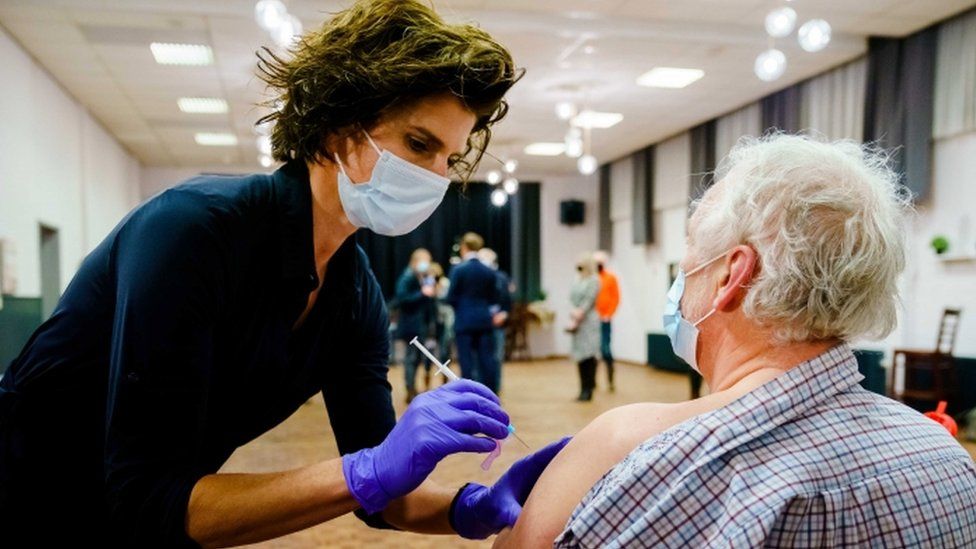Covid-19: 'No evidence' of AstraZeneca jab problems, says WHO
 image copyrightEPA
image copyrightEPAThe World Health Organization has said there is no evidence that incidents involving blood clots are caused by the Oxford-AstraZeneca vaccine.
In a statement, the WHO said it was reviewing reports relating to the jab, but it was important that vaccination campaigns continued.
It was good practice to investigate potential adverse events, it added.
Germany on Monday joined several other European countries in halting vaccinations as a precaution.
There have been a number of cases in Europe of blood clots developing after the vaccine was administered.
However, experts say the number of blood clots reported after the vaccine were no more than those typically reported within the general population.
About 17 million people in the EU and the UK have received a dose of the vaccine, with fewer than 40 cases of blood clots reported as of last week, AstraZeneca said.
What do the WHO and other experts say?
WHO spokesman Christian Lindmeier said the body was investigating the reports.
"As soon as WHO has gained a full understanding of these events, the findings and any unlikely changes to current recommendations will be immediately communicated to the public," he said.
"As of today, there is no evidence that the incidents are caused by the vaccine and it is important that vaccination campaigns continue so that we can save lives and stem severe disease from the virus."
The European Medical Association - which is also currently carrying out a review into incidents of blood clots - said the vaccine could continue to be administered.
The UK medicines regulator also said evidence "does not suggest" the jab causes clots, as it urged people in the country to get the vaccine when asked to do so.
Professor Andrew Pollard, director of the Oxford vaccine group that developed the Oxford-AstraZeneca jab, told the BBC's Today programme there was "very reassuring evidence that there is no increase in a blood clot phenomenon here in the UK, where most of the doses in Europe [have] been given so far".

Right to ask questions

While vast numbers of people are being vaccinated at pace around the world, some of them will still get sick with other things unrelated to the vaccine.
These pauses for the AstraZeneca vaccine are not because it is unsafe to give. It's to allow time for experts to explore why a small number of people who were recently given the shot also developed blood clots.
When an illness occurs shortly after vaccination, it is right to question whether the shot might have contributed in any way.
There is no indication or evidence, however, that the vaccine was linked or responsible.
In the UK, more than 11 million people have already received at least one dose of the AstraZeneca vaccine and there has been no sign of excess deaths or blood clots occurring. Europe's drug regulator has also backed the vaccine, saying its benefits are clear. Covid can be deadly and vaccination saves lives.

What measures are being taken?
Germany's health ministry announced on Monday that it would stop administering the Oxford-AstraZeneca vaccine with immediate effect, on the recommendation of the Paul Ehrlich Institute (PEI), the country's authority on vaccines.
"After new reports of thromboses of the cerebral veins in connection with the vaccination in Germany and Europe, the PEI considers further investigations to be necessary," the ministry said, quoted by AFP news agency.
The suspension came less than a day after the Netherlands did the same. It said its suspension - which will last until at least 29 March - was a precaution.
The Irish Republic, Denmark, Norway, Bulgaria and Iceland have also temporarily halted inoculations with the vaccine, while the Democratic Republic of Congo and Indonesia have postponed the launch of their rollouts. Several European countries, including Italy and Austria, have suspended the use of certain batches of the drug as a precautionary measure.
Thailand announced that it would start using the vaccine on Tuesday, following a brief delay to the rollout over safety concerns.
In a statement, the Dutch government said it was acting out of precaution following reports from Denmark and Norway of possible serious side effects.
Dutch drug watchdog Pharmacovigilance Centre Lareb later said that 10 cases of possible adverse side effects had been reported in the Netherlands.
"We can't allow any doubts about the vaccine," Health Minister Hugo de Jonge said. "We have to make sure everything is right, so it is wise to pause for now."
Sunday's decision will now cause delays in the Dutch vaccination programme.
The authorities had pre-ordered 12 million doses of AstraZeneca, with nearly 300,000 jabs scheduled in the next two weeks.
What did AstraZeneca say?
It said there was no evidence of an increased risk of clotting due to the vaccine.
It said that across the EU and United Kingdom there had been 15 events of deep-vein thrombosis (DVT) - a blood clot in a vein - and 22 events of pulmonary embolism - a blood clot that has entered the lungs - reported among those vaccinated.
AstraZeneca said these figures were "much lower than would be expected to occur naturally in a general population of this size and is similar across other licensed Covid-19 vaccines".
"The nature of the pandemic has led to increased attention in individual cases and we are going beyond the standard practices for safety monitoring of licensed medicines in reporting vaccine events, to ensure public safety," Ann Taylor, the firm's chief medical officer, said.



- EASY STEPS: How to keep safe
- A SIMPLE GUIDE: What are the symptoms?
- SOCIAL DISTANCING: How can I meet my friend safely?
- HEALTH MYTHS: The fake advice you should ignore
- MAPS AND CHARTS: Visual guide to the outbreak



No comments